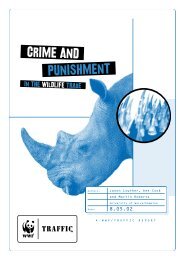In full swing: assessment of trade in orang-utans and ... - WWF UK
In full swing: assessment of trade in orang-utans and ... - WWF UK
In full swing: assessment of trade in orang-utans and ... - WWF UK
You also want an ePaper? Increase the reach of your titles
YUMPU automatically turns print PDFs into web optimized ePapers that Google loves.
Law enforcement<br />
<strong>In</strong>itiative for confiscations<br />
From the analysis above, it seems that there are large regional differences <strong>in</strong> the practice <strong>of</strong> confiscation <strong>and</strong> law<br />
enforcement. Some KSDA <strong>of</strong>fices seem to be more active <strong>in</strong> confiscat<strong>in</strong>g protected animals, <strong>in</strong>clud<strong>in</strong>g gibbons <strong>and</strong><br />
<strong>orang</strong>-<strong>utans</strong>, whereas <strong>in</strong> others, no action whatsoever seems to be taken (Bambang & Suherdjoko, 2003). Especially <strong>in</strong><br />
regencies where the wildlife rescue centres have been established, certa<strong>in</strong> KSDA <strong>of</strong>fices are active, albeit follow<strong>in</strong>g<br />
different strategies. For <strong>in</strong>stance, KSDA <strong>in</strong> the Bogor-Sukabumi-Cianjur area almost exclusively targets private owners<br />
<strong>and</strong> few confiscations have been made at the bird markets <strong>in</strong> the region (although admittedly, the number <strong>of</strong> protected<br />
animals <strong>of</strong>fered for sale at the bird markets <strong>in</strong> this region has decreased significantly over the past few years). As such,<br />
the majority <strong>of</strong> gibbons <strong>and</strong> <strong>orang</strong>-<strong>utans</strong> that have arrived at the Cikanagan wildlife rescue centre orig<strong>in</strong>ate from private<br />
owners. <strong>In</strong> contrast, it appears that the KSDA <strong>in</strong> the Malang-Surabaya regency follows a policy that targets bird markets<br />
more frequently, <strong>and</strong> a relatively small proportion <strong>of</strong> the gibbons <strong>and</strong> <strong>orang</strong>-<strong>utans</strong> <strong>in</strong> the Petungsewu wildlife rescue<br />
centre are derived from private owners.<br />
The <strong>in</strong>itiative for confiscat<strong>in</strong>g animals at either bird markets or from private owners <strong>in</strong> many cases may not come from<br />
the BKSDA but from the wildlife rescue centres <strong>and</strong> NGOs themselves <strong>and</strong> the speed <strong>of</strong> action is likely to vary accord<strong>in</strong>g<br />
to levels <strong>of</strong> co-operation <strong>and</strong> trust. Although formally a task <strong>of</strong> the BKSDA, it was common procedure for the<br />
wildlife rescue centres to provide the fund<strong>in</strong>g <strong>and</strong> logistic support for the confiscations. Furthermore, all KSDA staff<br />
members that were <strong>in</strong>volved <strong>in</strong> the operations received some monetary support (c. IDR25 000 - 30 000 (USD2.70 - 3.25<br />
at 2004 rates), per day, the equivalent <strong>of</strong> a normal day's work).<br />
Legal follow-up<br />
The number <strong>of</strong> confiscated gibbons <strong>and</strong> <strong>orang</strong>-<strong>utans</strong> held at the wildlife rescue centres <strong>and</strong> zoos totals >110 <strong>in</strong>dividuals.<br />
It was not possible to get <strong>in</strong>formation on the orig<strong>in</strong> <strong>of</strong> a large number <strong>of</strong> gibbons <strong>and</strong> <strong>orang</strong>-<strong>utans</strong>, especially those <strong>in</strong><br />
zoos, but it is expected that some <strong>of</strong> those were also the result <strong>of</strong> confiscations. Details from only a few cases <strong>of</strong> legal<br />
prosecution were obta<strong>in</strong>ed, despite a considerable amount <strong>of</strong> effort put <strong>in</strong>to determ<strong>in</strong><strong>in</strong>g the legal follow-up from<br />
confiscations (both by solicit<strong>in</strong>g <strong>in</strong>formation from NGOs that were <strong>in</strong>volved <strong>in</strong> monitor<strong>in</strong>g <strong>of</strong> wildlife <strong>trade</strong> <strong>and</strong> by<br />
request<strong>in</strong>g <strong>in</strong>formation from the wildlife rescue centres <strong>and</strong> several KSDA regional <strong>of</strong>fices). Only <strong>in</strong> a few <strong>in</strong>stances <strong>in</strong><br />
which people either kept gibbons or <strong>orang</strong>-<strong>utans</strong> or <strong>trade</strong>d <strong>in</strong> them, <strong>and</strong> where the animals were confiscated, had there<br />
been a legal follow-up that led to a conviction. Traders that are known to have sold gibbons <strong>and</strong>/or <strong>orang</strong>-<strong>utans</strong>, but were<br />
convicted for sell<strong>in</strong>g or keep<strong>in</strong>g other protected animals, were not <strong>in</strong>cluded <strong>in</strong> the <strong>assessment</strong>; neither were private<br />
owners that were convicted for the illegal possession <strong>of</strong> wildlife other than gibbons or <strong>orang</strong>-<strong>utans</strong>, even if they were<br />
currently hold<strong>in</strong>g gibbons or <strong>orang</strong>-<strong>utans</strong>.<br />
Undoubtedly cases <strong>of</strong> convictions have been missed. However, from the <strong>in</strong>formation presented <strong>in</strong> Table 12, the data<br />
received from NGOs <strong>and</strong> <strong>of</strong>ficers from the KSDA <strong>in</strong> writ<strong>in</strong>g, as well as discussions with them, it seems that very few<br />
people have been prosecuted for the illegal possession or <strong>trade</strong> <strong>in</strong> gibbons <strong>and</strong> <strong>orang</strong>-<strong>utans</strong>. <strong>In</strong> the past few years, only<br />
on Bali have consistent prosecutions occurred. <strong>In</strong> all, fewer than 10% <strong>of</strong> all persons that had gibbons <strong>and</strong>/or <strong>orang</strong>-<strong>utans</strong><br />
confiscated from them (remember<strong>in</strong>g that a fairly large number are given the opportunity to h<strong>and</strong> <strong>in</strong> their animals as<br />
donations) were actually prosecuted.<br />
Sentenc<strong>in</strong>g <strong>of</strong> <strong>of</strong>fenders is still a problem as many <strong>of</strong> the judges do not see wildlife <strong>trade</strong> or keep<strong>in</strong>g protected species<br />
as pets as a serious <strong>of</strong>fence (Willie Smits, Gibbon Foundation, pers. comm. to V<strong>in</strong>cent Nijman, 2003). Because <strong>of</strong> this<br />
lack <strong>of</strong> commitment from the judges, rarely are maximum sentences h<strong>and</strong>ed out, <strong>and</strong> more frequently, the <strong>of</strong>fenders are<br />
IN FULL SWING:ASSESSMENT OF TRADE IN ORANGUTANS AND GIBBONS ON JAVA AND BALI,INDONESIA 36


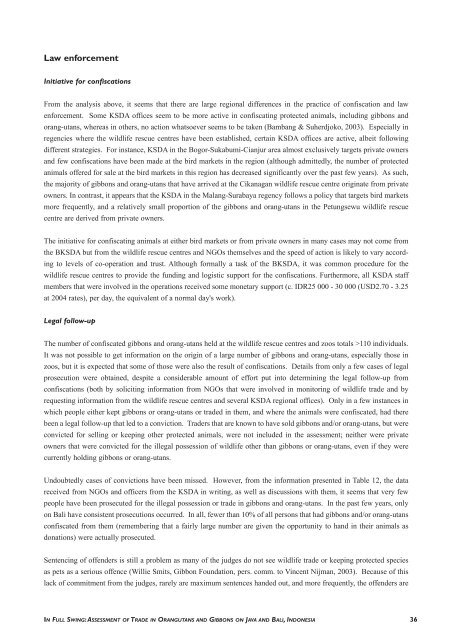
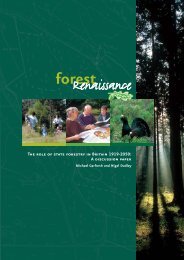
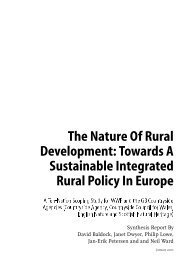
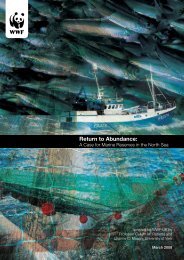

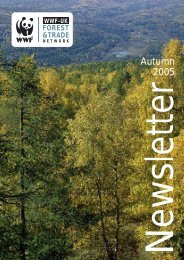
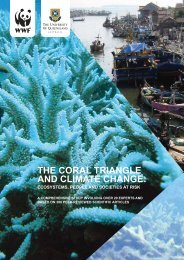
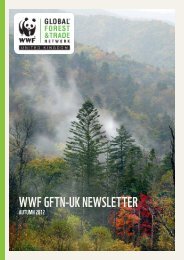
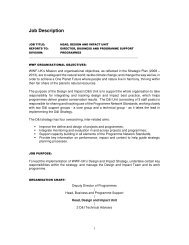
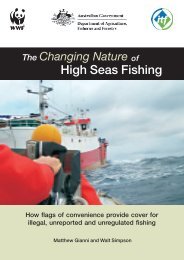
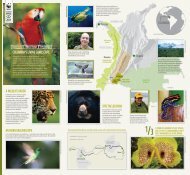
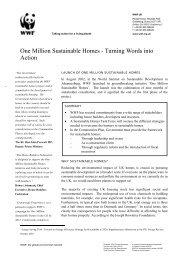
![[PDF] Causes for concern: chemicals and wildlife - WWF UK](https://img.yumpu.com/31929970/1/184x260/pdf-causes-for-concern-chemicals-and-wildlife-wwf-uk.jpg?quality=85)
